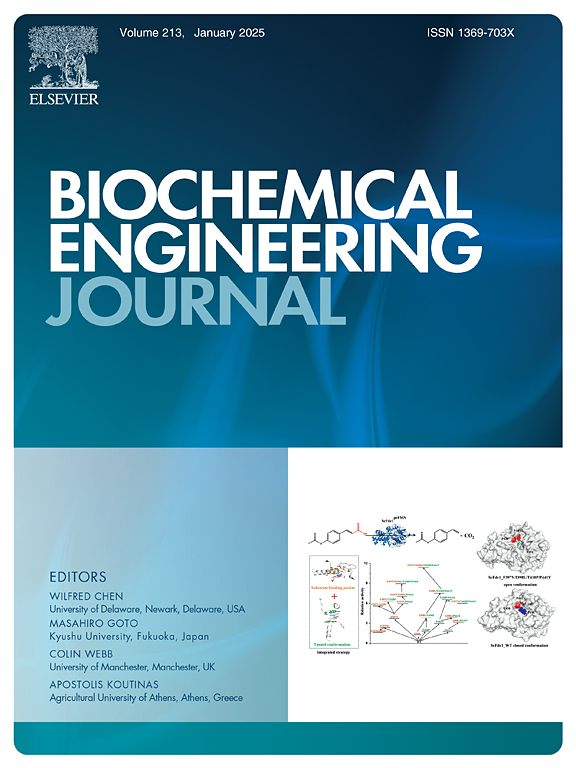利用代谢工程策略提高酿酒酵母中 S-腺苷-L-蛋氨酸的合成能力
IF 3.7
3区 生物学
Q2 BIOTECHNOLOGY & APPLIED MICROBIOLOGY
引用次数: 0
摘要
S- 腺苷-L-蛋氨酸(SAM)在各种生理过程中发挥着关键作用。随着 SAM 在肝病、抑郁症、骨关节炎和老年痴呆症等疾病治疗中的应用日益广泛,人们对 SAM 的生产产生了浓厚的兴趣。目前,酿酒酵母是 SAM 的主要工业生产者。随着对 SAM 需求的激增,改善 SAM 的生物合成具有重要意义。本研究采用了多模块工程策略来提高 SAM 的产量:1) 增强硫同化途径的基因表达;2) 加强 SAM 合成途径的代谢通量;3) 削弱 SAM 降解途径;4) 增加 ATP 供应。结果发现,SC06(S. cerevisiae CEN.PK2-1CΔgal80∷Tcyc1-sam2-Pgal1-Pgal10-met14-Tadh1,Δlsc2∷Tcyc1-hom6-Pgal1-Pgal10-met6-Tadh1,Δsah1Δmls1)的SAM滴度最高,为240.86 mg/L,比原菌株提高了10.22倍。在优化条件下,突变体 SC06 在摇瓶发酵中的 SAM 滴度达到 473.02 mg/L,比产量为 127.18 mg/g(干细胞重量)。在 5 升的发酵罐中进行分批进行发酵,经过 58 小时的培养,突变体 SC06 的 SAM 产量达到 1.25 克/升,比产量为 166.67 毫克/克干细胞重量(DCW)。因此,已建立的代谢工程策略在提高 S. cerevisiae CEN.PK2-1C 的 SAM 产率方面表现出了良好的效率,可为 SAM 生产菌株的改良提供有用的工具。本文章由计算机程序翻译,如有差异,请以英文原文为准。
Enhanced S-adenosyl-L-methionine synthesis in Saccharomyces cerevisiae using metabolic engineering strategies
S-adenosyl-L-methionine (SAM) plays pivotal roles in various physiological processes. With its increasing application in the treatment of diseases such as liver disease, depression, osteoarthritis and Alzheimer's, interest in SAM production aroused. Currently, Saccharomyces cerevisiae is the main industrial producer of SAM. With the surge in demand for SAM, improving the SAM biosynthesis is of importance. In this study, a multimodule engineering strategy was employed to improving SAM production: 1) Enhancing the gene expression of the sulfur assimilation pathway; 2) Strengthening the metabolic flux of the SAM synthesis pathway; 3) Weakening the SAM degradation pathway; 4) Increasing ATP supply. The resulting engineered mutant SC06 (S. cerevisiae CEN.PK2–1CΔgal80∷Tcyc1-sam2-Pgal1-Pgal10-met14-Tadh1, Δlsc2∷Tcyc1-hom6-Pgal1-Pgal10-met6-Tadh1, Δsah1Δmls1) displayed the highest SAM titer of 240.86 mg/L, which was 10.22-fold increase compared with the original strain. With optimized conditions, the SAM titer of mutant SC06 in shake flask fermentation reached 473.02 mg/L with a specific yield of 127.18 mg/g dry cell weight (DCW). In a 5 L fermenter with fed-batch fermentation, the maximal SAM yield of mutant SC06 reached 1.25 g/L with a specific yield of 166.67 mg/g DCW after 58 h cultivation. Therefore, the established metabolic engineering strategies displayed promising efficiency in improving the SAM productivity of S. cerevisiae CEN.PK2–1C, which may provide a useful tool for the improvement of SAM-producing strains.
求助全文
通过发布文献求助,成功后即可免费获取论文全文。
去求助
来源期刊

Biochemical Engineering Journal
工程技术-工程:化工
CiteScore
7.10
自引率
5.10%
发文量
380
审稿时长
34 days
期刊介绍:
The Biochemical Engineering Journal aims to promote progress in the crucial chemical engineering aspects of the development of biological processes associated with everything from raw materials preparation to product recovery relevant to industries as diverse as medical/healthcare, industrial biotechnology, and environmental biotechnology.
The Journal welcomes full length original research papers, short communications, and review papers* in the following research fields:
Biocatalysis (enzyme or microbial) and biotransformations, including immobilized biocatalyst preparation and kinetics
Biosensors and Biodevices including biofabrication and novel fuel cell development
Bioseparations including scale-up and protein refolding/renaturation
Environmental Bioengineering including bioconversion, bioremediation, and microbial fuel cells
Bioreactor Systems including characterization, optimization and scale-up
Bioresources and Biorefinery Engineering including biomass conversion, biofuels, bioenergy, and optimization
Industrial Biotechnology including specialty chemicals, platform chemicals and neutraceuticals
Biomaterials and Tissue Engineering including bioartificial organs, cell encapsulation, and controlled release
Cell Culture Engineering (plant, animal or insect cells) including viral vectors, monoclonal antibodies, recombinant proteins, vaccines, and secondary metabolites
Cell Therapies and Stem Cells including pluripotent, mesenchymal and hematopoietic stem cells; immunotherapies; tissue-specific differentiation; and cryopreservation
Metabolic Engineering, Systems and Synthetic Biology including OMICS, bioinformatics, in silico biology, and metabolic flux analysis
Protein Engineering including enzyme engineering and directed evolution.
 求助内容:
求助内容: 应助结果提醒方式:
应助结果提醒方式:


